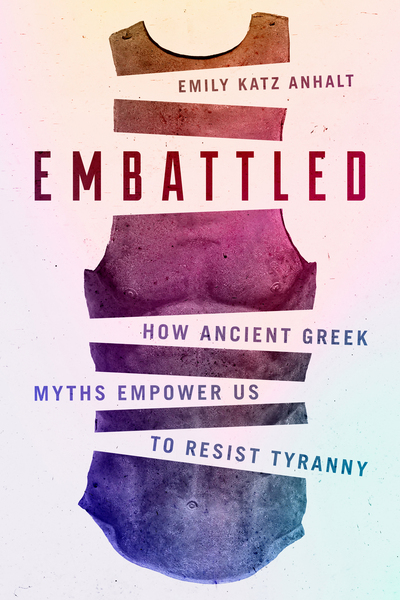
2021
320 pages.
$35.00
Hardcover ISBN: 9781503628564
Ebook ISBN: 9781503629400
An incisive exploration of the way Greek myths empower us to defeat tyranny.
As tyrannical passions increasingly plague twenty-first-century politics, tales told in ancient Greek epics and tragedies provide a vital antidote. Democracy as a concept did not exist until the Greeks coined the term and tried the experiment, but the idea can be traced to stories that the ancient Greeks told and retold. From the eighth through the fifth centuries BCE, Homeric epics and Athenian tragedies exposed the tyrannical potential of individuals and groups large and small. These stories identified abuses of power as self-defeating. They initiated and fostered a movement away from despotism and toward broader forms of political participation.
Following her highly praised book Enraged: Why Violent Times Need Ancient Greek Myths, the classicist Emily Katz Anhalt retells tales from key ancient Greek texts and proceeds to interpret the important message they hold for us today. As she reveals, Homer's Iliad and Odyssey, Aeschylus's Oresteia, and Sophocles's Antigone encourage us—as they encouraged the ancient Greeks—to take responsibility for our own choices and their consequences. These stories emphasize the responsibilities that come with power (any power, whether derived from birth, wealth, personal talents, or numerical advantage), reminding us that the powerful and the powerless alike have obligations to each other. They assist us in restraining destructive passions and balancing tribal allegiances with civic responsibilities. They empower us to resist the tyrannical impulses not only of others but also in ourselves.
In an era of political polarization, Embattled demonstrates that if we seek to eradicate tyranny in all its toxic forms, ancient Greek epics and tragedies can point the way.
About the author
Emily Katz Anhalt is Professor of Classics at Sarah Lawrence College. Her most recent book is Enraged: Why Violent Times Need Ancient Greek Myths, which was selected as one of the Times Literary Supplement's Best Books of 2017.
"Anhalt encourages readers to look with fresh eyes at how easily power can be abused and how to fight back against despotic rule. Her engaging retellings of stories from ancient Greek epic and tragedy show just how relevant these texts are in the political climate of the twenty-first century."
—Donna Zuckerberg, author of Not All Dead White Men: Classics and Misogyny in the Digital Age
"The Greeks endured violence and demagoguery but also created antidotes, from the Odyssey's depiction of survival skills like rational deliberation, to the deep probes of politics by Aeschylus and Sophocles. Emily Katz Anhalt brilliantly articulates what this hard-won ancient wisdom offers those battling anti-democratic forces today."
—Richard Martin, author of Myths of the Ancient Greeks
"A thought-provoking exploration of how the ancient Greeks developed forms of storytelling to interrogate what it means to be a leader and how despotic leaders tend to abuse their power. The ancient myths at the center of this book speak to the present moment with uncanny prescience, as if written for our time as both a warning and an opportunity to rehearse the moral choices that we and our leaders must make each day."
—Bryan Doerries, author of The Theater of War: What Ancient Greek Tragedies Can Teach Us Today
"Anhalt's prose is wonderfully readable and at the same time deeply scholarly. She elucidates the social/political/psychological realities represented in these classic texts and demonstrates how critical reading of literature enables one to see one's own realities and their inherent dangers more clearly...Recommended."
—M. F. McClure, CHOICE
Our current political climate presents us with steep challenges. We could start by working toward exposing more students, and others, to these stories and texts in the first place. Even that seems an increasingly high bar. An engaging and readable volume like this one can help by presenting readers with the complexities and subtleties of Homer and the tragedies in an accessible way, and by encouraging us all to think with these myths as we try to understand our modern world, and, one hopes, work to improve it."
—Daniel W. Berman, Bryn Mawr Classical Review